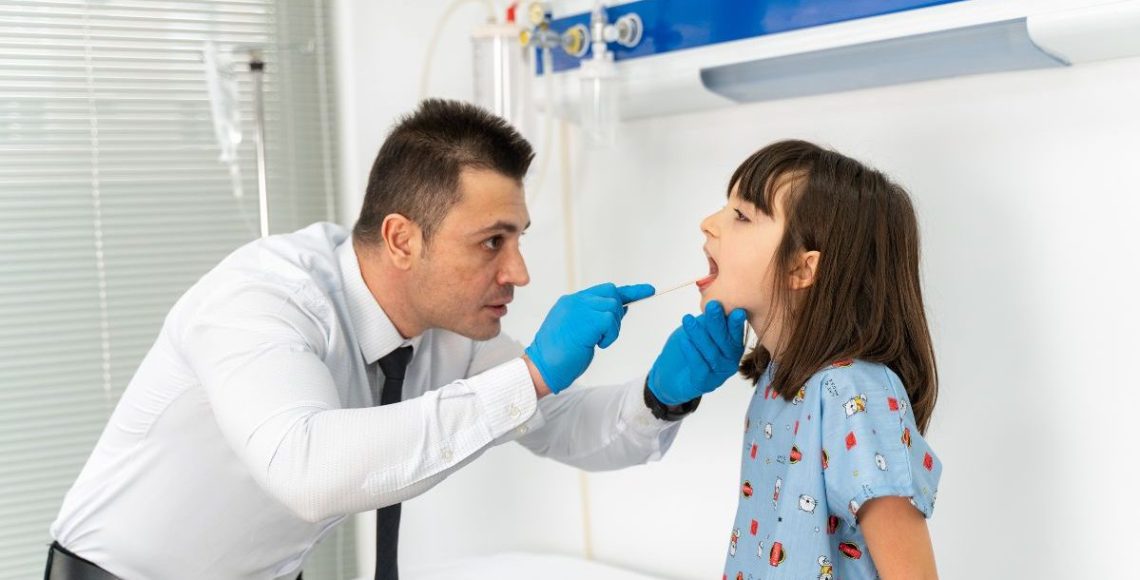Introduction
Strep throat is a common and highly contagious infection caused by Group A Streptococcus (GAS) bacteria. It spreads easily, particularly in schools, homes, and crowded environments, affecting children most often but also adults. While antibiotics are highly effective at treating the infection, understanding how contagious strep is—and how to stop it from spreading—is crucial for protecting yourself and others.
This article explores how strep spreads, its incubation period, signs of contagiousness, and the most effective prevention strategies to contain the infection.
What Is Strep Throat?
Strep throat is a bacterial infection that causes inflammation in the throat and tonsils. It often comes on suddenly, with symptoms such as:
- Severe sore throat
- Painful swallowing
- Fever
- Swollen lymph nodes
- Red, inflamed tonsils (sometimes with white patches)
Because symptoms overlap with common viral illnesses, testing with a rapid strep test or throat culture is necessary to confirm the diagnosis.
Is Strep Throat Contagious?
Yes—highly.
Strep throat is very contagious and easily spreads through close contact, especially:
- In families
- Schools
- Daycares
- Dormitories
- Workplaces with shared airspace or surfaces
Even people who feel mildly ill or are asymptomatic can spread the bacteria.
How Does Strep Throat Spread?
Strep is transmitted through:
1. Respiratory Droplets:
When an infected person coughs, sneezes, or talks, they release droplets carrying the bacteria.
2. Direct Contact:
Touching the mouth, nose, or eyes after contact with contaminated hands, tissues, or surfaces.
3. Shared Items:
Using someone else’s utensils, cups, toothbrushes, or towels can pass on the infection.
Incubation Period of Strep Throat
The incubation period is the time between exposure to the bacteria and the appearance of symptoms.
- Typically 2 to 5 days
- A person can unknowingly spread the infection before realizing they’re sick.
This means someone infected on Monday might not feel symptoms until Thursday—but could already be contagious.
How Long Is Strep Contagious?
Without Treatment:
- A person with strep throat can remain contagious for 2–3 weeks, even if symptoms fade.
With Antibiotic Treatment:
- No longer contagious after 24 hours of starting antibiotics.
- That’s why doctors often recommend staying home from school or work for at least one full day after beginning treatment.
When Are You Most Contagious?
- Right before and shortly after symptoms start.
- Especially when fever is present and symptoms like coughing or sneezing are active.
- Even mild symptoms can still transmit the infection.
Are Asymptomatic Carriers Contagious?
Yes—some people, especially children, may carry the strep bacteria in their throat without symptoms and still spread it.
- These “carriers” may not need treatment unless symptoms develop or they’re in close contact with vulnerable individuals (like those with weak immune systems).
Who’s at Highest Risk of Catching Strep?
- Children ages 5–15
- Parents of infected children
- Teachers and daycare workers
- People in crowded environments
How to Prevent the Spread of Strep Throat
1. Start Antibiotics Promptly
- If diagnosed, begin antibiotics immediately and avoid contact with others until you’ve taken them for at least 24 hours.
2. Practice Good Hand Hygiene
- Wash hands frequently with soap and water for at least 20 seconds.
- Use hand sanitizer when soap isn’t available.
3. Cover Coughs and Sneezes
- Use a tissue or your elbow to cover your mouth and nose.
- Dispose of tissues immediately and wash hands afterward.
4. Avoid Sharing Personal Items
- Don’t share cups, utensils, towels, or toothbrushes.
- Wash contaminated items in hot water and soap.
5. Clean Surfaces Regularly
- Disinfect commonly touched items: door handles, phones, remote controls, and desks.
6. Replace Toothbrushes
- After 24–48 hours of antibiotic treatment, replace the infected person’s toothbrush to avoid reinfection.
7. Keep Sick Individuals Home
- Children and adults with strep should stay home for at least 24 hours after starting antibiotics and until fever-free.
How to Protect Others at Home or School
- Isolate the sick individual when possible (separate bedroom or bathroom).
- Encourage hydration and symptom relief to reduce sneezing/coughing.
- Notify schools, daycares, or workplaces of confirmed strep cases to prevent outbreaks.
When to Get Tested
You should be tested for strep if you or your child has:
- A sudden sore throat with fever
- Swollen tonsils or white patches
- No cough or runny nose (points more to strep than a cold)
- Painful, swollen neck lymph nodes
- Been in close contact with someone diagnosed with strep
A rapid strep test gives results in 10–15 minutes. If negative, but suspicion remains high, a throat culture may be performed.
Conclusion
Strep throat is highly contagious, especially during its incubation period and early symptom phase. Fortunately, it’s also highly treatable with antibiotics, which not only speed up recovery but drastically reduce the risk of spreading the infection. Understanding how strep spreads, when it’s most contagious, and how to prevent transmission can help protect your family, classroom, or workplace from outbreaks.
With prompt treatment and good hygiene, strep throat doesn’t have to become a shared experience.
FAQs:
How long is strep throat contagious?
Without antibiotics, up to 2–3 weeks. With antibiotics, most people are no longer contagious after 24 hours.
What is the incubation period for strep throat?
Strep throat typically develops 2 to 5 days after exposure to the bacteria.
Can you spread strep before showing symptoms?
Yes. People can be contagious during the incubation period, even before symptoms appear.
Do you need to stay home from work or school with strep throat?
Yes. You should stay home until 24 hours after starting antibiotics and being fever-free.
Can strep throat spread through shared items?
Absolutely. Utensils, cups, toothbrushes, and even toys can carry the bacteria—avoid sharing and disinfect often.






